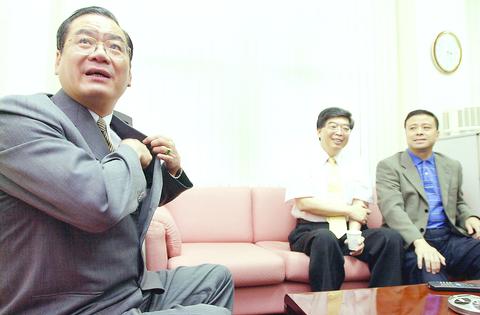Leaders of opposition legislative caucuses agreed yesterday to a special legislative session being held to review financial bills seen as key to the nation's financial reform.
The legislation, which has been proposed by the Cabinet, failed to pass before the closure of the legislative session last Wednesday.
But lawmakers representing the KMT, People First Party and New Party said yesterday that the session could only be held -- for constitutional reasons -- after President Chen Shui-bian (

PHOTO: GEORGE TSORNG, TAIPEI TIMES
"The bills to be considered in the provisional session have to be urgent and important ones," said Cheng Yung-chin (
Chen said yesterday he respects the decision of the legislature and would do his part to make the special session possible.
The dates of the provisional session are expected to be decided in negotiations between the ruling and opposition parties.
The bills targeted by the Cabinet include the enactment of the Financial Holding Company Law, the Statute for the Establishment and Management of the Financial Reconstruction Fund, the Securities and Finance Management Law and amendments to the Business Tax Law, the Insurance Law and laws regarding deposit insurance.
During a visit to Legislative Yuan speaker Wang Jin-pyng (王金平) on Thursday, Premier Chang Chun-hsiung (張俊雄) expressed his wish that lawmakers could pass the bills early by holding a special session, rather than waiting until the next session which is set to open on Sept. 18.
According to the Constitution, in addition to being held at the request of the president, a provisional session can also be held if initiated by lawmakers with the endorsement of at least a quarter of the legislative body.
Also on Thursday, Chen promised he would issue an official statement asking for a provisional legislature session, if the legislature considered this a more proper method to handle the matter.
Wang, who has always believed the session should be held at the request of the president, reiterated yesterday that the legislature must take a cautious attitude on the issue.
"Unless there are major national affairs to consider, the legislature will lack the legitimacy to hold a provisional session," Wang said.
Opposition lawmakers, meanwhile, said Chang should explain to the public the importance and urgency of the bills before the special session is held.
In addition, the Cabinet should put forth a complete list of its urgent bills that are to be considered in the upcoming provisional session, if there are other ones in addition to the six aforementioned bills, the lawmakers said.

INVESTIGATION: The case is the latest instance of a DPP figure being implicated in an espionage network accused of allegedly leaking information to Chinese intelligence Democratic Progressive Party (DPP) member Ho Jen-chieh (何仁傑) was detained and held incommunicado yesterday on suspicion of spying for China during his tenure as assistant to then-minister of foreign affairs Joseph Wu (吳釗燮). The Taipei District Prosecutors’ Office said Ho was implicated during its investigation into alleged spying activities by former Presidential Office consultant Wu Shang-yu (吳尚雨). Prosecutors said there is reason to believe Ho breached the National Security Act (國家安全法) by leaking classified Ministry of Foreign Affairs information to Chinese intelligence. Following interrogation, prosecutors petitioned the Taipei District Court to detain Ho, citing concerns over potential collusion or tampering of evidence. The

‘FORM OF PROTEST’: The German Institute Taipei said it was ‘shocked’ to see Nazi symbolism used in connection with political aims as it condemned the incident Sung Chien-liang (宋建樑), who led efforts to recall Democratic Progressive Party (DPP) Legislator Lee Kun-cheng (李坤城), was released on bail of NT$80,000 yesterday amid an outcry over a Nazi armband he wore to questioning the night before. Sung arrived at the New Taipei City District Prosecutors’ Office for questioning in a recall petition forgery case on Tuesday night wearing a red armband bearing a swastika, carrying a copy of Adolf Hitler’s Mein Kampf and giving a Nazi salute. Sung left the building at 1:15am without the armband and apparently covering the book with a coat. This is a serious international scandal and Chinese

Seventy percent of middle and elementary schools now conduct English classes entirely in English, the Ministry of Education said, as it encourages schools nationwide to adopt this practice Minister of Education (MOE) Cheng Ying-yao (鄭英耀) is scheduled to present a report on the government’s bilingual education policy to the Legislative Yuan’s Education and Culture Committee today. The report would outline strategies aimed at expanding access to education, reducing regional disparities and improving talent cultivation. Implementation of bilingual education policies has varied across local governments, occasionally drawing public criticism. For example, some schools have required teachers of non-English subjects to pass English proficiency

TRADE: The premier pledged safeguards on ‘Made in Taiwan’ labeling, anti-dumping measures and stricter export controls to strengthen its position in trade talks Products labeled “made in Taiwan” must be genuinely made in Taiwan, Premier Cho Jung-tai (卓榮泰) said yesterday, vowing to enforce strict safeguards against “origin laundering” and initiate anti-dumping investigations to prevent China dumping its products in Taiwan. Cho made the remarks in a discussion session with representatives from industries in Kaohsiung. In response to the US government’s recent announcement of “reciprocal” tariffs on its trading partners, President William Lai (賴清德) and Cho last week began a series of consultations with industry leaders nationwide to gather feedback and address concerns. Taiwanese and US officials held a videoconference on Friday evening to discuss the